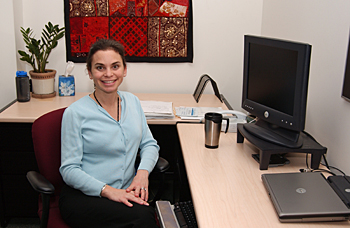MBA students in Smith's organizational behavior classes, “Managing People in Organizations,” were assigned to do just that by working with local organizations on site to identify challenges in the workplace and carry out research and make recommendations using the tools they learned in her class.
”It's a win-win situation for students to gain hands-on experience and for organizations to get a fresh, informed viewpoint and practical suggestions,” Smith said.
Students formed teams and connected with a variety of organizations, from large national corporations to local companies and nonprofit groups. Those included Habitat for Humanity, Longwood Gardens, YMCA, the DuPont Co., Rohm and Haas, Bank of America and Discover Cards.
The teams gathered information and data from the organizations, studied employee issues and made recommendations, using their knowledge to diagnose challenges and problems and come up with an action plan.
For example, Smith said, Habitat for Humanity was increasing its staff of one to a staff of 25 and was upgrading its building program from three houses a year to 25. The group studied how to make the transition and effectively manage the growth of the operation.
Lauren Crissman, an MBA student who works as a business analyst for TransUnion Settlement Solutions, a real estate services organization, was one of a five-member group that worked on a problem identified by the company. As part of her job, she works with a TransUnion operations group and documents and audits their work processes, she said. She also writes training documentation, trains new hires and designs and tests production systems.
The MBA students studied a 12-person team at TransUnion, which was anticipating a 300 percent increase in its workload and also had a high turnover of personnel. After studying the operation by analyzing quality data and carrying out one-on-one interviews with employees and management, the UD students recommended changes for implementing more effective self-managed teams.
The project was well-aligned with company goals, Crissman said, and the management team was “very receptive” and will continue to work on implementing the changes.
Roseann Boyer graduated from UD with a degree in mechanical engineering and is a part-time student in the MBA program. She currently is working as a process engineer for Rohm and Haas, which manufactures specialty chemicals.
The MBA team focused on the Rohm and Haas plant in Newark. The challenge was to improve production yields and decrease errors in manufacturing. After extensive research, the team concluded that a lack of intrinsic (internal, self-driven) motivation was a factor affecting production.
The group surveyed more than 100 operators about their motivation and analyzed the data for an action plan. They recommended that Rohm and Haas address the survey results, Boyer said, and also made suggestions about job security issues, improving feedback mechanisms, allowing for more individual autonomy on the production floor and cross-training for operators.
Overall, the students' presentations on their projects were excellent, Smith said, and the students have made a difference in the organizations through their research, interaction and suggestions and also gained experience in the real business world.
A graduate of Yale University, Smith received her master's degree in psychology from Harvard University and her doctorate in organizational behavior from Harvard Business School. She joined the UD faculty in June 2006 after serving as a visiting lecturer at the Wharton School of Business at the University of Pennsylvania.
Article by Sue Moncure



